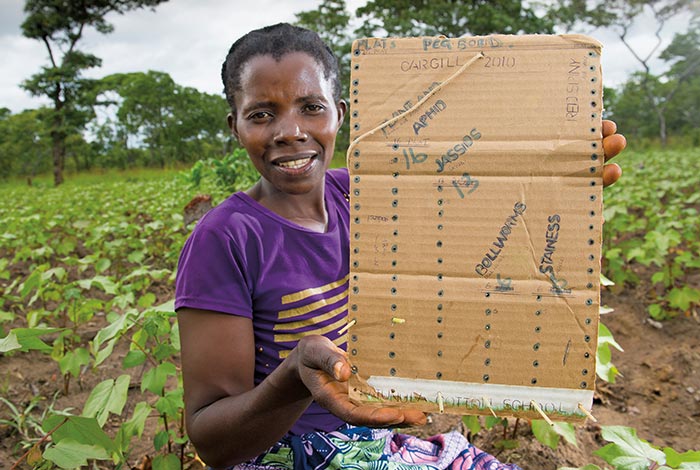Cultivating Farm Skills & Community in Zambia
Cargill helps 70,000 smallholder farmers improve crops and establish prospering communities.
January 01, 2015
Zambia is home to fertile soil and consistent rainfall, but economic and sociocultural obstacles, combined with a lack of farming knowledge, have prevented rural communities from realizing their full agricultural potential. To change this pattern, Cargill is focused on educating farmers in the country, where the average annual income is less than US $1,400, to help them cultivate a sustainable supply of crops.
Through the company’s network of 1,600 training schools, nearly 70,000 of Zambia’s smallholder farmers are learning modern techniques and gaining access to higher-quality crop inputs. By teaching them the importance of proper land preparation, seeding, and weed and pest control, Cargill is helping them enhance crop quality, increase yields, and in effect, earn higher incomes.

[image caption] Pest control is a persistent problem in Zambia. By tracking species and learning about pesticides, farmers have reduced annual chemical sprays by nearly 50%.
To provide support to Zambia’s female smallholder farmers, Cargill has formed more than 800 Cargill Women’s Clubs throughout the country, granting these women access to much-needed resources that enhance their skills and strengthen their farm operations. By offering lines of credit, better seeds and improved harvesting methods, Cargill helps increase what female farmers take to market. Then, tailored marketing support helps them sell what they grow. In addition, the clubs’ education on gender issues helps women navigate inequality in Zambian culture—a major push for social change.
Cargill has also joined the Competitive African Cotton Initiative (COMPACI), a collaboration between the private sector, the Bill & Melinda Gates Foundation and several German development organizations. Cargill’s role has focused on its cotton operations throughout Zambia, which source their crops from nearly 70,000 smallholder farmers. Together with the Aid by Trade Foundation, COMPACI has launched Cotton Made in Africa (CMiA), an initiative that aims to improve the livelihoods of these farmers by providing consumers worldwide with a socially and environmentally responsible cotton brand. In 2011, Cargill became a verified CMiA partner.
The company is also providing broader support to its agricultural communities by investing in education and infrastructure: building new schools, installing solar panels to generate sustainable energy and constructing water wells that provide safe drinking water.
This work to improve the lives of people in Zambia has been widely recognized. In 2013, The American Chamber of Commerce in Zambia presented Cargill with its inaugural Excellence in Corporate Citizenship Award. And the progress continues today: the company is now supporting farmers as they harvest cotton sustainably, as well as another profitable crop: maize.
